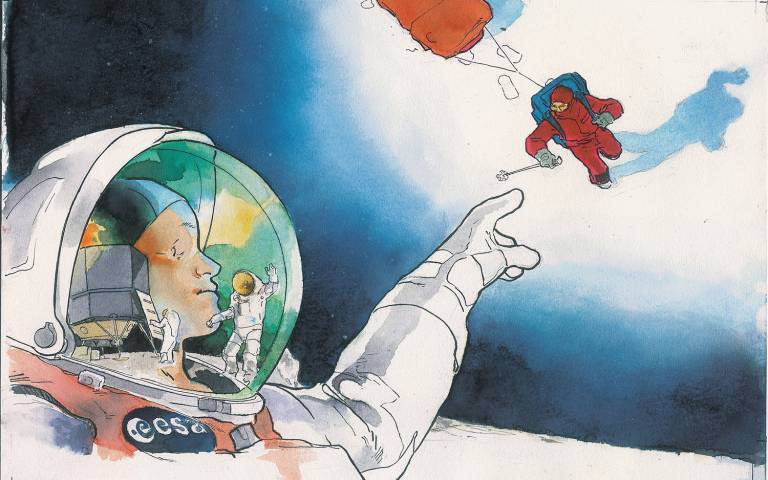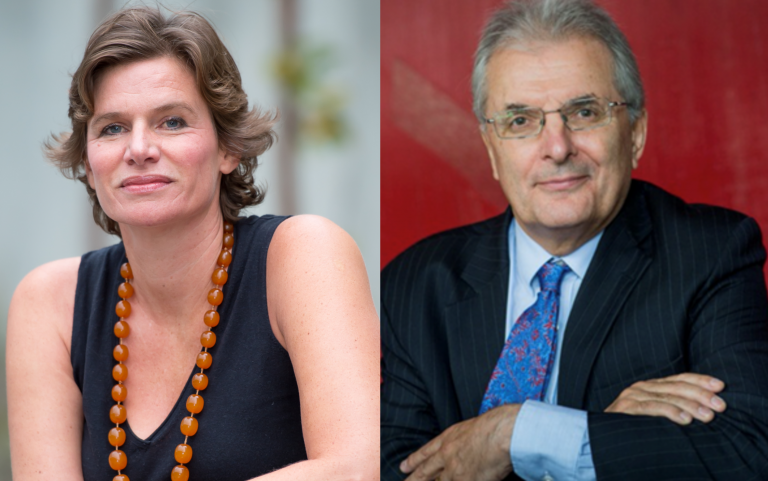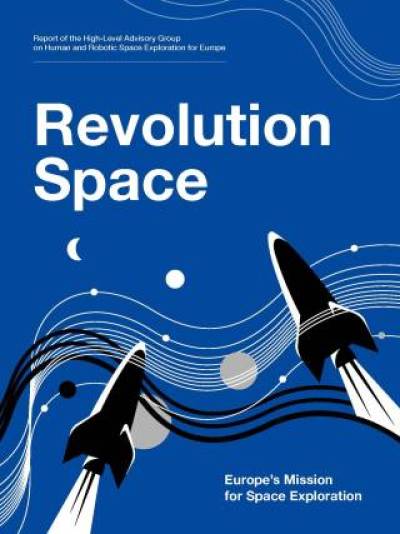Europe urged to aim high in space exploration
23 March 2023
A panel of high level experts, including UCL academics Professor Mariana Mazzucato and Professor Chris Rapley, has recommended that the European Space Agency should embark on a revolutionary endeavour to significantly increase its autonomy in human and robotic space exploration.

The purpose is to reap grand geopolitical, economic and social benefits.
In its report, entitled “Revolution Space: Europe’s Mission for Space Exploration”, the 12-member advisory group argued that human space exploration was undergoing a revolution that Europe could not afford to miss.
The report said: “Countries and regions that will not secure their independent access to space and its autonomous use, will become strategically dependent and economically deprived of a major part of this value chain. Europe’s goal should be to capture one third of this future market.”
It will also allow Europe to retain its position as second to none in Earth observation, navigation and telecommunications, and a world leader in the use of science to uncover the mysteries of the Universe, and in robotic and human exploration of the solar system.
The group presented its independent report on the state of European space exploration to the ESA Council at the ESA headquarters in Paris today. ESA’s 22 member states include the UK.
Co-author Professor Chris Rapley CBE (UCL Earth Sciences) said: “The report seeks a revolution in the European means to access space. It promises to be a game-changer, placing European astronauts firmly in the pilot’s seat on journeys to the Moon and beyond.”

The group, which includes prominent figures in government, industry, academic and civil society, was established in the summer of 2022 at the request of ESA’s Council.
It was mandated to provide an independent and objective assessment on the geopolitical, economic and societal relevance of human and robotic space exploration for Europe.
In its report, the group noted that Europe had no independent human launch capacity and therefore relied on non-European partners to send people to space, which was threatening its future as a credible actor on the global economic and geopolitical scene.
For this reason, the advisory group said that Europe needed to significantly increase its investment in human exploration, and develop its own human spaceflight transportation capabilities to secure and foster the benefits of a booming space economy. The report covered human and robotic exploration which are both essential for an exploration strategy.
The report also highlighted the exponential growth of the total worth of the global space sector, and said that “the cost of inaction would far outweigh the necessary investment to establish Europe as a strong and independent space actor.”
The report suggested that greater investment in space exploration will help attract top talent, maintain excellence and unite Europe through a grand vision. It argued that greater autonomy in this area would make Europe a stronger and more attractive partner for international cooperation.
The advisory group also pointed out that Europe would have to adopt a new procurement model if it wanted to make the most of this space revolution, allowing industry to innovate and flourish while cutting costs.
Anders Fogh Rasmussen, former Danish Prime Minister and a member of the advisory group, introduced the report with a speech calling for more investment in space exploration. “Let us be bold, let us put Europe at the forefront of space exploration!” he said, adding: “If we fail to do so, we will fall behind and become dependent of others.”

ESA Director General Josef Aschbacher welcomed the independent report and the challenge it set out. He said: “Europe is a technology leader in many domains, from ground transportation to clean energy production and from chip manufacturing to the circular economy.
“We lead in the space domain too, except for human spaceflight where we have been relying on international partners. We mustn’t let access to space be an area that escapes European expertise and leadership.
“The ‘Revolution Space’ report is a wake-up call for European leaders to act now and not miss this opportunity. ESA has the expertise and the ambition. Together with our innovative industry, ESA can make it happen.”
An ESA Council working group has been set up review the recommendations of the Revolution Space report and prepare for the next Space Summit, which will be held in Sevilla, Spain, on 6 November 2023.
Professor Chris Rapley, a Professor of Climate Science at UCL, is Chair of the European Space Sciences Committee (ESSC), Europe’s most prominent space advisory body which deals with the full spectrum of space sciences. His previous roles include the Directorships of the International Geosphere-Biosphere Programme, British Antarctic Survey and the Science Museum. He is Chair of the UCL Climate Action Unit.
Professor Mariana Mazzucato is Professor in the Economics of Innovation and Public Value at UCL, where she is Founding Director of the Institute for Innovation & Public Purpose (IIPP), and author of Mission Economy: a moonshot guide to changing capitalism. She advises policy makers around the world on innovation-led, inclusive and sustainable growth. She is Chair of the WHO Council on the Economics of Health for All, Co-Chair of the Global Commission on the Economics of Water, and Co-Chair of the Council on Urban Initiatives.
The 12 members of the advisory group are:
- Stefania Giannini, former Minister of Education, University and Research of Italy;
- Erling Kagge, explorer and the first person to reach on foot all three “poles” (the North Pole, the South Pole and Mount Everest);
- Mariana Mazzucato, Professor at UCL, Director of the Inst. for Innovation and Public Purpose, and Author of Mission Economy;
- Maria Theresia Niss, Member of the National Council of Austria and Chair of the European Inter-Parliamentary Space Conference;
- Cédric O, Former Secretary of State for the Digital Sector of France;
- Chris Rapley, Professor of Climate Science at UCL and Chair of the European Science Foundation’s European Space Sciences Committee;
- Anders Fogh Rasmussen, former NATO Secretary General and former Prime Minister of Denmark;
- Anna Rathsman, Chair of ESA Council and Director General of the Swedish National Space Agency;
- Tomasz Rożek, science communicator;
- François Schuiten, best-selling comic book artist;
- Christoph Schweizer, Chief Executive Officer of Boston Consulting Group;
- Saadia Zahidi, Managing Director of the World Economic Forum.
Links
- Full copy of the report
- Professor Chris Rapley’s academic profile
- Professor Mariana Mazzucato’s academic profile
- UCL Earth Sciences
- UCL Mathematical & Physical Sciences
- UCL Institute for Innovation & Public Purpose
- The Bartlett, UCL’s Faculty of the Built Environment
Source
Images
- Top: Terrae Novae illustration. Terrae Novae is ESA’s exploration plan. Credits: ESA–Olivier Pâques
- Middle: Professors Mariana Mazzucato and Chris Rapley
- Bottom: Front cover of the report
 Close
Close

